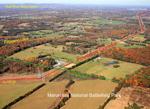Trade unions back massive ‘rural crescent’ data center plan | News | princewilliamtimes.com
Union heads say the projects would generate construction jobs for years
- By Daniel Berti Times Staff Writer
- Updated

photo by Roger Snyder
The Northern Virginia Labor Federation and the Baltimore-D.C. Building and Construction Trades Council, who together represent more than 50,000 construction and building trades workers in the D.C. metro region, have thrown their support behind the plan, citing high wages and steady employment opportunities for their workers. It is not uncommon for labor organizations to endorse a single development plan, but neither organization has publicly backed a data center project in Prince William County until now.
The PW Digital Gateway could create up to 21 million square feet of data center space, making it the largest potential string of data centers Prince William County. The build-out of such facilities would likely take more than a decade, generating hundreds if not thousands of new construction jobs.

courtesy photo/Roger Snyder
“For this steady stream of data centers to be popping up in the region, that’s really significant and is a huge stabilizing force for construction workers in the area,” said Greg Akerman, Northern Virginia director for the Baltimore-D.C. Building and Construction Trades Council, about the digital gateway proposal.
Council President Stephen Courtien said the organization has not publicly backed Northern Virginia data center developments in the past but that opposition from conservation groups and others prompted them to make their support for the digital gateway proposal more public.
“The reason we haven’t had to publicly support others is there wasn’t pushback,” he said.
Virginia Diamond, executive director for the Northern Virginia Labor Federation, said the proposal would provide county residents with opportunities “to get good jobs in the building trades” and for “residents from underserved communities to get into good apprenticeship programs” in a rapidly expanding industry.
“This type of development can really help the community,” Diamond said.
Data center industry expanding in Prince William
In the last decade, Prince William County has become a major hub for data centers. The huge, windowless, box-shaped buildings house computer systems and servers critical for running the internet. They use large amounts of electricity and are often sited along major electrical transmission lines. As demand for data center space rose during the pandemic, the industry drove up land prices in the county with some larger parcels recently selling to data center developers for close to $1 million an acre.
The digital gateway is controversial because it is the first string of data center campuses proposed for the county’s “rural crescent,” a 117,000-acre area along the western edge of the county where residential development is limited and industrial development is generally not allowed.
The plan could reshape at least 800 acres of mostly undeveloped agricultural land along Pageland Lane that partially borders Manassas National Battlefield Park and Conway Robinson State Forest, off U.S. 29. Its proposal has been extremely contentious since it was first announced in March. It’s drawn unanimous backlash from local conservation groups and Republican county supervisors, while some Democratic supervisors have signaled their support because of its potential to generate tens of millions in local tax revenue.
Prince William County supervisors will decide Tuesday whether to take the first step toward …
Union support splits supervisors
So far, only one supervisor, Victor Angry, D-Neabsco, has explicitly stated his support for the plan. In a recent interview, Angry said he welcomed union support, saying the gateway development would create “take-care-of-the-family” jobs for Prince William County workers. He also pushed back on criticism that data centers create few long-term jobs.
“Everyone talks about how data centers don’t create jobs. It may not have jobs at the end of it, but what it creates is job opportunities for small businesses and contractors,” Angry said.
Board Chair Ann Wheeler and Supervisors Andrea Bailey, D-Potomac, and Margaret Franklin, D-Woodbridge, did not respond to emailed requests for comment.
Supervisor Pete Candland, R-Gainesville, who once said he would fight any data center development in the county’s rural area “tooth and nail,” was more reserved in his response to questions about the plan last week, signaling that his position could be softening.
“Land use decisions have long-lasting impacts that go well beyond any one special interest. Proposals such as PW Digital Gateway have to be considered with input from many different entities and not for the benefit of any one group,” Candland said.
Supervisor Jeanine Lawson, R-Brentsville, however, said she would continue to stand with residents, historic preservation and environmentalist groups and national park advocates in opposition. Lawson is vying for the Republican nomination for Congress in Virginia’s 10th District.
“Union politics should be absolutely irrelevant to any land use decisions made by the board, although it’s a sign some board members are desperate to drum up support for PW Digital Gateway,” Lawson said in an email.
The debate over data center growth in the county has largely revolved around where they should be placed. The Prince William County Department of Economic Development has said the county’s existing “Data Center Opportunity Zone,” a nearly 10,000-acre area where data centers are allowed by-right, has nearly run out of available land for data center development.
Christina Winn, executive director of the Prince William Department of Economic Development, said in a July 30 letter to the planning department that only 90 to 830 “developable greenfield acres remain within” the data center overlay district.

Daniel Berti
Those estimates have been disputed by some environmental and conservation groups. The Piedmont Environmental Council conducted its own analysis of the data center district and found at least 3,100 acres remaining in the district that could be suitable for data centers, according to Julie Bolthouse, the council’s deputy director of land use.
A new coalition of six local and regional environmental groups fighting the expansion of data centers in the county, including Piedmont Environmental Council, the Prince William Conservation Alliance and the National Parks Conservation Alliance, also questioned organized labor’s support for the project in a recent email.
“We are wondering why the unions are supporting a controversial project for data centers that are adjacent to a national park, within the watershed for our public drinking and in the rural crescent, as opposed to data centers that are in our industrial area, where the impacts are significantly less,” said Kim Hosen, executive director of the Prince William Conservation Alliance.
Reach Daniel Berti at dberti@fauquier.com
